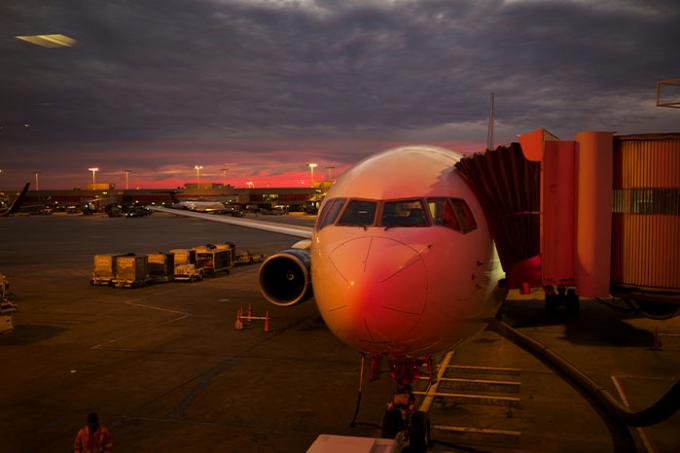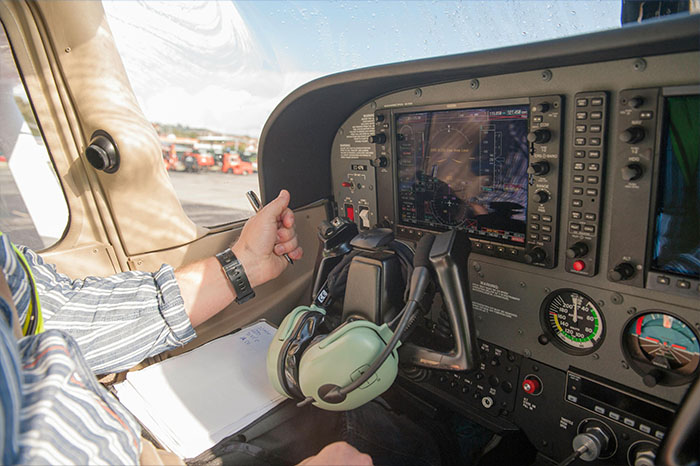
Read More: FAA Pilot Checkride is the Hardest Test, Is It True?
Pilots face several high pressure situations, and they manage stress through a combination of preparation, training, and mental techniques. Here’s how they stay calm and collected during their demanding job:
Training and Preparation: Pilots undergo extensive training, including simulator sessions for high-pressure scenarios, helping them stay calm and react appropriately in emergencies.
Clear Communication: Effective communication with co-pilots, crew members, and air traffic control is crucial. This teamwork helps reduce stress by ensuring everyone is on the same page during challenging situations.
Stress Management Techniques: Pilots use methods like controlled breathing, positive self-talk, and staying organized through checklists to manage anxiety and stay focused during stressful moments.
Physical and Mental Health: Maintaining physical fitness, proper nutrition, and getting enough rest are key factors in managing stress. A healthy body and mind help pilots stay alert and resilient under pressure.
Experience: With more flight hours and experience, pilots become more adept at handling stressful situations, as they are better prepared to recognize and respond to potential issues quickly.
By incorporating these strategies, pilots are able to manage stress effectively, ensuring safety and performance during flights.
Pilots employ a combination of techniques to manage stress effectively:
Pre Flight Preparation: Pilots review flight details, weather conditions, and potential hazards, which helps them anticipate challenges and prepare accordingly.
Training: Simulation training prepares pilots for high-stress situations, helping them remain composed in emergencies.
Mindfulness Practices: Relaxation techniques like deep breathing and visualization keep pilots focused and calm during flights.
Physical Fitness: Maintaining physical fitness helps pilots stay alert and resilient, making them better equipped to handle stressful situations.
Pilots rely on the 5 A's of Stress Management to cope with stress effectively:
Avoid: Remove stressors when possible, like delegating tasks or avoiding unnecessary pressure.
Alter: Modify your approach to reduce stress, such as adjusting your workload or communication style.
Adapt: Change your mindset to deal with unavoidable stress more healthily.
Accept: Acknowledge what you cannot control and focus on what you can influence.
Ask: Seek support from colleagues, mentors, or professional resources when needed.
Read More: The 5 Hazardous Attitudes in Aviation and How to Spot Them
Pilots deal with challenges like bad weather, fatigue, and long hours. Here’s how they overcome these hurdles:
Bad Weather: Pilots review weather forecasts before the flight, plan alternate routes, and maintain continuous communication with air traffic control to navigate through adverse conditions.
Fatigue: Pilots follow regulatory rest periods, rotate crews during long flights, and prioritize hydration and balanced nutrition. They also take regular breaks to stay alert and focused.
Personal Coping Strategies: Regular exercise, proper sleep, and maintaining social connections all play a role in helping pilots manage stress. Support from colleagues or professional mental health services can also be invaluable.

Pilot Training for Handle Stress Situations (Source Image: Pexels/Luis Peralta)
Stress management is a constant companion for pilots, but with the right tools and strategies, it’s manageable. By focusing on preparation, clear communication, and maintaining both physical and mental health, pilots can stay calm, focused, and perform at their best even in the most stressful situations. The good news is, mastering stress management is something any pilot can do with practice and the right support.
Ready to take your stress management skills to the next level? Start your journey today with 14DAYPILOT's training program, designed to help you stay sharp and confident in the cockpit.

Stress management is crucial for pilots to stay focused, make quick decisions, and perform safely under pressure. With the right techniques and preparation, pilots can effectively handle the high demands of their profession. They face numerous challenges, including navigating adverse weather, managing complex flight systems, and handling unexpected emergencies. Let’s explore stress management tips that help pilots handle pressure with focus and confidence.
Read More: FAA Pilot Checkride is the Hardest Test, Is It True?
Pilots face several high pressure situations, and they manage stress through a combination of preparation, training, and mental techniques. Here’s how they stay calm and collected during their demanding job:
Training and Preparation: Pilots undergo extensive training, including simulator sessions for high-pressure scenarios, helping them stay calm and react appropriately in emergencies.
Clear Communication: Effective communication with co-pilots, crew members, and air traffic control is crucial. This teamwork helps reduce stress by ensuring everyone is on the same page during challenging situations.
Stress Management Techniques: Pilots use methods like controlled breathing, positive self-talk, and staying organized through checklists to manage anxiety and stay focused during stressful moments.
Physical and Mental Health: Maintaining physical fitness, proper nutrition, and getting enough rest are key factors in managing stress. A healthy body and mind help pilots stay alert and resilient under pressure.
Experience: With more flight hours and experience, pilots become more adept at handling stressful situations, as they are better prepared to recognize and respond to potential issues quickly.
By incorporating these strategies, pilots are able to manage stress effectively, ensuring safety and performance during flights.
Pilots employ a combination of techniques to manage stress effectively:
Pre Flight Preparation: Pilots review flight details, weather conditions, and potential hazards, which helps them anticipate challenges and prepare accordingly.
Training: Simulation training prepares pilots for high-stress situations, helping them remain composed in emergencies.
Mindfulness Practices: Relaxation techniques like deep breathing and visualization keep pilots focused and calm during flights.
Physical Fitness: Maintaining physical fitness helps pilots stay alert and resilient, making them better equipped to handle stressful situations.
Pilots rely on the 5 A's of Stress Management to cope with stress effectively:
Avoid: Remove stressors when possible, like delegating tasks or avoiding unnecessary pressure.
Alter: Modify your approach to reduce stress, such as adjusting your workload or communication style.
Adapt: Change your mindset to deal with unavoidable stress more healthily.
Accept: Acknowledge what you cannot control and focus on what you can influence.
Ask: Seek support from colleagues, mentors, or professional resources when needed.
Read More: The 5 Hazardous Attitudes in Aviation and How to Spot Them
Pilots deal with challenges like bad weather, fatigue, and long hours. Here’s how they overcome these hurdles:
Bad Weather: Pilots review weather forecasts before the flight, plan alternate routes, and maintain continuous communication with air traffic control to navigate through adverse conditions.
Fatigue: Pilots follow regulatory rest periods, rotate crews during long flights, and prioritize hydration and balanced nutrition. They also take regular breaks to stay alert and focused.
Personal Coping Strategies: Regular exercise, proper sleep, and maintaining social connections all play a role in helping pilots manage stress. Support from colleagues or professional mental health services can also be invaluable.

Pilot Training for Handle Stress Situations (Source Image: Pexels/Luis Peralta)
Stress management is a constant companion for pilots, but with the right tools and strategies, it’s manageable. By focusing on preparation, clear communication, and maintaining both physical and mental health, pilots can stay calm, focused, and perform at their best even in the most stressful situations. The good news is, mastering stress management is something any pilot can do with practice and the right support.
Ready to take your stress management skills to the next level? Start your journey today with 14DAYPILOT's training program, designed to help you stay sharp and confident in the cockpit.
Giorgeo Tarigan is an FAA-certified commercial pilot with expertise in flying both single and multi-engine airplanes. He is also an Advanced Ground Instructor and Instrument Ground Instructor. With experience ferrying airplanes in the US and abroad, Giorgeo is committed to providing excellent training and helping students pass their checkrides with flying colors.
Giorgeo Tarigan is an FAA-certified commercial pilot with expertise in flying both single and multi-engine airplanes. He is also an Advanced Ground Instructor and Instrument Ground Instructor. With experience ferrying airplanes in the US and abroad, Giorgeo is committed to providing excellent training and helping students pass their checkrides with flying colors.